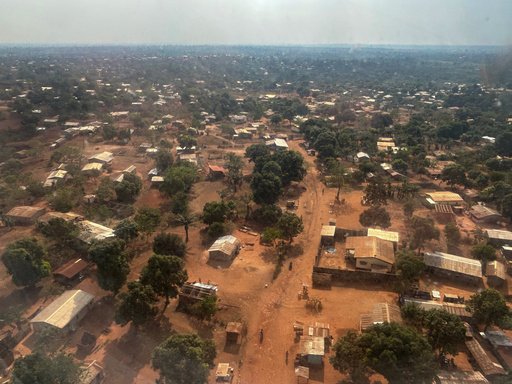
BANGUI, Central African Republic — Allegations have emerged from human rights organizations and political figures in the Central African Republic that two soldiers who went missing after being detained last month were taken by mercenaries affiliated with Russia. Over the past few years, the Kremlin has strengthened its relations with the military and government in this mineral-rich nation, known for its gold and diamonds.
Celestin Bakoyo and Elie Ngouengue are the names of the two soldiers who were reportedly taken into custody on January 24 at a police station located in the capital city. These soldiers were previously leaders of a militia associated with the Wagner Group, which has been engaging in conflicts against rebel factions in the southeastern part of the country.
Politician Ernest Mizedio, who hails from the same region, stated that the two soldiers were part of a larger group that was apprehended by Russian mercenaries intended for training local militia forces and integrating them into the national army. Mizedio expressed frustration over their disappearance, saying, “We searched without success for where they took them.” He also mentioned that supporters had reached out to both law enforcement and those affiliated with Russian security contractors for information, only to be met with silence regarding the soldiers’ fate.
Mizedio, affiliated with a political opposition party, noted ongoing protests and public demonstrations taking place in the southeastern region where residents are voicing their discontent over the soldiers’ arrests. While neither the Wagner Group nor the military provided any statements regarding the situation, an anonymous police officer mentioned that mercenaries are increasingly competing for influence and positioning themselves as replacements for local law enforcement in areas plagued by conflict.
Before their disappearance, Bakoyo and Ngouengue had traveled to the capital with the intention of opening bank accounts to access their salaries following their integration into the national army. This situation unfolds against the backdrop of Russia’s growing military presence and economic ambitions across Africa, with the involvement of mercenaries aimed at stabilizing regimes and combating extremist threats.
Joseph Bindoumi, president of the Central African Republic’s League for Human Rights, condemned the soldiers’ disappearances, labeling them kidnappings. He emphasized that irrespective of any alleged misconduct by the soldiers, there should be transparency regarding their situations. Bindoumi remarked, “We have the right to know if standard procedures are being followed. We have the right to see people to ensure their well-being and to ensure their parents, advocates, and lawyers can visit them.”
In the Obo region, residents have expressed a long-standing fear of the rebel factions against whom the Russian mercenaries and the militia have been fighting. Yet, sentiments have shifted, with the community now expressing anger towards the mercenaries themselves. Robert Mboli, a resident in Obo, articulated his feelings by stating, “We are outraged to understand the Russians’ idea to train the Azande Ani Kpi Gbe militiamen was to control their movement and decapitate them.” He added that there will be ongoing demonstrations until a clear explanation of the soldiers’ accusations is provided.
The Central African Republic was among the initial locales where Russian mercenaries began operations. Amid prolonged clashes between government forces and predominantly Muslim rebel groups, many citizens and officials acknowledged the assistance provided by Russian fighters in countering armed factions that threatened to seize control of Bangui in 2021. Nevertheless, these mercenaries have faced numerous allegations of human rights violations and neglect of civilian safety. A 2023 investigation from a U.S.-based watchdog, The Sentry, revealed claims that mercenaries were teaching the army torture techniques and had been implicated in executions, torture, and sexual violence against civilians during their operations against dissenting armed groups.

